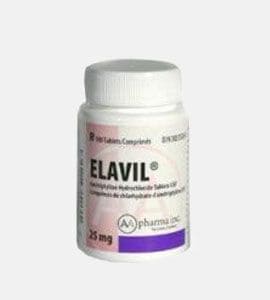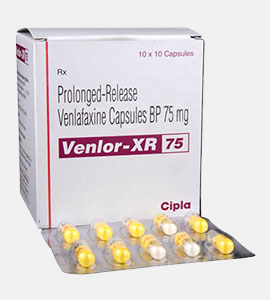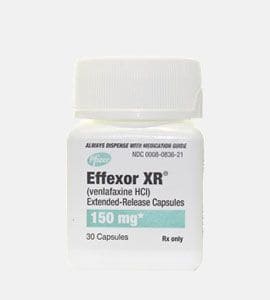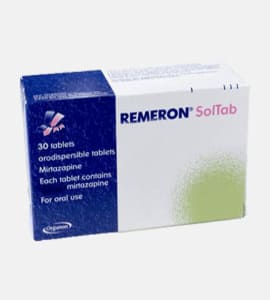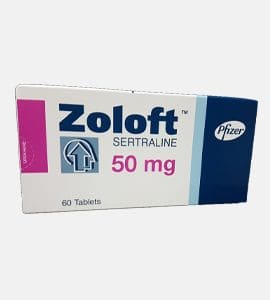What Is Venlafaxine And What Does It Treat?
Venlafaxine is an antidepressant medication that works in the brain. It is approved for the treatment of the major depressive disorder (MDD), generalized anxiety disorder (GAD), panic disorder, and social anxiety disorder (social phobia).
Symptoms of depression include:
• Depressed mood — feeling sad, empty, or tearful
• Feeling worthless, guilty, hopeless, and helpless
• Loss of interest or pleasure in your usual activities
• Sleep and eat more or less than usual (for most people it is less)
• Low energy, trouble concentrating, or thoughts of death (suicidal thinking)
• Psychomotor agitation (‘nervous energy’)
• Psychomotor retardation (feeling like you are moving and thinking in slow motion)
• Suicidal thoughts or behaviours
Generalized Anxiety Disorder (GAD) occurs when a person experiences excessive anxiety or worry for at least six months. Other symptoms include:
• Restlessness
• Fatigue (low energy, feeling tired all the time)
• Difficulty concentrating
• Irritability
• Muscle tension
• Sleep disturbance (difficulty falling asleep or waking up in the middle of the night)
Panic Disorder occurs when a person experiences unexpected and repeated episodes of intense fear. These episodes have physical symptoms including chest pain, shortness of breath, heart palpitations, sweating, dizziness, and nausea. Fear of future episodes is also part of panic disorder.
Social phobia/social anxiety disorder is a fear of situations where one may feel as if they are being judged by others. Symptoms include:
• Blushing
• Difficulty talking
• Nausea
• Sweating
• Shaking
Venlafaxine may also be helpful when prescribed “off-label” for attention-deficit/hyperactivity disorder (ADHD) in adults and children/adolescents, diabetic neuropathy, migraine prevention, hot flashes, obsessive compulsive disorder (OCD), posttraumatic stress disorder (PTSD), and premenstrual dysphoric disorder (PMDD) . “Off-label” means that it hasn't been approved by the Food and Drug Administration for this condition. Your mental health provider should justify his or her thinking in recommending any “off-label” treatment. They should be clear about the limits of the research around that medication and if there are any other options.
What Is The Most Important Information I Should Know About Venlafaxine?
Do not stop taking venlafaxine, even when you feel better. With input from you, your health care provider will assess how long you will need to take the medicine.
Missing doses of venlafaxine may increase your risk for relapse in your symptoms.
Stopping venlafaxine abruptly may result in one or more of the following withdrawal symptoms: irritability, nausea, feeling dizzy, vomiting, nightmares, headache, and/or paresthesias (prickling, tingling sensation on the skin).
Depression is also a part of bipolar illness. People with bipolar disorder who take antidepressants may be at risk for "switching" from depression into mania. Symptoms of mania include "high" or irritable mood, very high self-esteem, decreased need for sleep, pressure to keep talking, racing thoughts, being easily distracted, frequently involved in activities with a large risk for bad consequences (for example, excessive buying sprees).
Medical attention should be sought if serotonin syndrome is suspected. Please refer to serious side effects for signs/symptoms.
Are There Specific Concerns About Venlafaxine And Pregnancy?
If you are planning on becoming pregnant, notify your healthcare provider to best manage your medications. People living with MDD who wish to become pregnant face important decisions. Untreated MDD has risks to the fetus, as well as the mother. It is important to discuss the risks and benefits of treatment with your doctor and caregivers. For women who take antidepressant medications during weeks 13 through the end of their pregnancy (second and third trimesters), there is a risk that the baby can be born before it is fully developed (before 37 weeks).
What Should I Discuss With My Healthcare Provider Before Taking Venlafaxine?
• Symptoms of your condition that bother you the most
• If you have thoughts of suicide or harming yourself
• Medications you have taken in the past for your condition, whether they were effective or caused any adverse effects
• If you experience side effects from your medications, discuss them with your provider. Some side effects may pass with time, but others may require changes in the medication.
• Any other psychiatric or medical problems you have, including a history of bipolar disorder
• All other medications you are currently taking (including over the counter products, herbal and nutritional supplements) and any medication allergies you have
• Other non-medication treatment you are receiving, such as talk therapy or substance abuse treatment. Your provider can explain how these different treatments work with the medication.
• If you are pregnant, plan to become pregnant, or are breast-feeding
• If you drink alcohol or use drugs
How Should I Take Venlafaxine?
Venlafaxine immediate-release tablets are usually taken two or three times per day with or without food. The extended-release tablets and capsules are taken one time per day with or without food.
Typically patients begin at a low dose of medicine and the dose is increased slowly over several weeks.
The dose usually ranges from 37.5 mg to 300 mg. Only your healthcare provider can determine the correct dose for you.
Extended-release tablets: Swallow whole; do not chew, crush, or break
Extended-release capsules: swallow whole or sprinkle onto food, such as applesauce or pudding and eat immediately
Consider using a calendar, pillbox, alarm clock, or cell phone alert to help you remember to take your medication. You may also ask a family member or a friend to remind you or check in with you to be sure you are taking your medication.
What Happens If I Miss A Dose Of Venlafaxine?
If you miss a dose of venlafaxine, take it as soon as you remember, unless it is closer to the time of your next dose. Discuss this with your healthcare provider. Do not double your next dose or take more than what is prescribed.
What Are Possible Side Effects Of Venlafaxine?
Common side effects
• Headache, nausea, diarrhoea, dry mouth, increased sweating
• Feeling nervous, restless, fatigued, sleepy or having trouble sleeping (insomnia)
These will often improve over the first week or two as you continue to take the medication.
• Sexual side effects, such as problems with orgasm or ejaculatory delay
• Increased blood pressure
These often do not improve over time.
Rare/serious side effects
Increased heart rate, low blood pressure, increased salivation, irregular menstrual cycle, increased frequency of urination, changes in taste, low sodium (symptoms of low sodium levels may include headache, weakness, difficulty concentrating and remembering), teeth grinding, difficulty urinating, angle-closure glaucoma (symptoms of angle-closure glaucoma may include eye pain, changes in vision, swelling or redness in or around the eye)
Serotonin syndrome (symptoms may include shivering, diarrhoea, confusion, severe muscle tightness, fever, seizures, and death)
SNRI antidepressants including venlafaxine may increase the risk of bleeding events. The combined use of aspirin, nonsteroidal anti-inflammatory drugs (e.g. ibuprofen, naproxen), warfarin, and other anti-coagulants may increase this risk. This may include gums that bleed more easily, nose bleed, or gastrointestinal bleeding. Some cases have been life-threatening.
How Long Does It Take For Venlafaxine To Work?
Sleep, energy, or appetite may show some improvement within the first 1-2 weeks. Improvement in these physical symptoms can be an important early signal that the medication is working. Depressed mood and lack of interest in activities may need up to 6-8 weeks to fully improve.
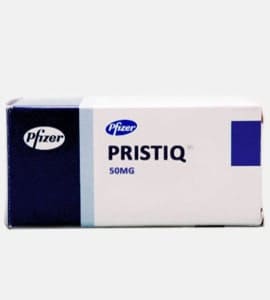

 English
English
 Čeština
Čeština
 Deutsch
Deutsch
 Español
Español
 Français
Français
 العربية
العربية
 Italiano
Italiano
 NZD
NZD


